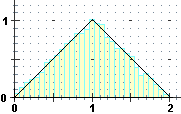
• X+Y < K, if X, Y ∈ [0,1]. If K = 0.75 I have:

Why Pr(X+Y < 0.75) = 0.28125? Why Pr(X+Y < 1) = 0.5? ...
 |  |
I can represent the distribution of X + Y with rnd+rnd (rndPrnd in italiano), rndrnd with the numerical outputs:


• With xy we evaluate the probability that - if X and Y are random numbers
uniformly distributed in [0,1) -
K = 0.5 n. tries = 16384e5 84.65836737061% K = 0.5 n. tries = 8192e5 84.6600970459% K = 0.5 n. tries = 4096e5 84.65567675781% K = 0.5 n. tries = 2048e5 84.65673828125% K = 0.5 n. tries = 1024e5 84.65756054688% K = 0.5 n. tries = 512e5 84.6545078125% K = 0.5 n. tries = 256e5 84.6526953125% K = 0.5 n. tries = 128e5 84.657828125% K = 0.5 n. tries = 64e5 84.651984375% K = 0.5 n. tries = 32e5 84.65771875% K = 0.5 n. tries = 16e5 84.666875% K = 0.5 n. tries = 8e5 84.579625% K = 0.5 n. tries = 4e5 84.644% K = 0.5 n. tries = 2e5 84.564% K = 0.5 n. tries = 1e5 84.398%
The probability is 84.66. With 107 tries and K = 0.05, 0.1, 0.2, ..., 0.9 I obtain values which I can represent with:

• The random numbers are obtained with the function random() (in JS script; in other languages it can have
different names), that produces a number taken at random (apparently - the number is generated by an algorithm) with uniform distribution in

